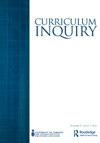“回顾我们的母亲”:有机关系课程
IF 1.6
3区 教育学
Q2 EDUCATION & EDUCATIONAL RESEARCH
引用次数: 1
摘要
“通过我们的母亲来思考”的女权主义主题要求我们去认领母亲的遗产,不是去认同她,也不是去否定她,而是在中间立场上成为我们自己。在这篇文章中,回顾我们母亲的有机关系课程的思路跨越了不同的时间和地点,包括不同的种族、性别、阶级、语言和国家背景。我沿着三条主线编织这条主线。首先,我将探讨互联性和关系动力学作为这门课程的核心所扮演的角色。其次,我讨论了母亲和女儿之间的创造性紧张关系,这是一种产生性的紧张关系,它暗示着在一个同时具有无/依恋、无/负担和无/归属的空间中重新夺回教室。第三,我认为,跨越差异的非暴力关系是建立一个课程社区的基础,这个社区欢迎他人的多样性,并发展富有同情心的关系。在借鉴不同的女性作家和女权主义课程学者的同时,我也加入了关于我母亲的自传故事,她是中国的一名退休教师。虽然这种持续的编织不会导致一种单一的混合产品,但尽管困难,感激之情却成为了一条声称母亲遗产的道路。本文章由计算机程序翻译,如有差异,请以英文原文为准。
“Thinking back through our mothers”: A curriculum of organic relationality
Abstract The feminist motif “thinking back through our mothers” calls us to claim the mother’s heritage, not to identify with her, not to repudiate her, but to become ourselves in a middle ground. In this article, the thread of thinking back through our mothers for a curriculum of organic relationality crosses different times and places and includes different racial, sexual, class, linguistic, and national contexts. I weave this thread thematically along three major lines. First, I explore the role of interconnectedness and relational dynamics as central to such a curriculum. Second, I discuss creative tensionality between mothers and daughters as generative and having implications for reclaiming the classroom in a space of simultaneous un/attachment, un/burdening, and non/belonging. Third, I argue that nonviolent relations across differences is the site for building a curriculum community that welcomes the alterity of the other and grows compassionate relationships. While drawing upon diverse women writers and feminist curriculum scholars, I also weave in autobiographical stories about my mother, who is a retired teacher educator in China. While this ongoing weaving does not lead to one singular blended product, gratitude despite difficulty emerges as one path to claim the maternal legacy.
求助全文
通过发布文献求助,成功后即可免费获取论文全文。
去求助
来源期刊

Curriculum Inquiry
EDUCATION & EDUCATIONAL RESEARCH-
CiteScore
3.10
自引率
17.60%
发文量
37
期刊介绍:
Curriculum Inquiry is dedicated to the study of educational research, development, evaluation, and theory. This leading international journal brings together influential academics and researchers from a variety of disciplines around the world to provide expert commentary and lively debate. Articles explore important ideas, issues, trends, and problems in education, and each issue also includes provocative and critically analytical editorials covering topics such as curriculum development, educational policy, and teacher education.
 求助内容:
求助内容: 应助结果提醒方式:
应助结果提醒方式:


